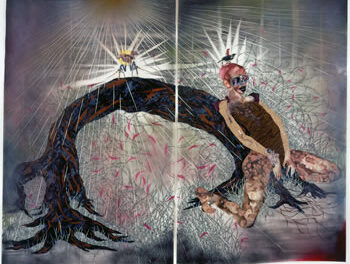]The Summer Festival of Chamber Music, sponsored by the Duke Institute of the Arts, is probably the best musical value you will find all year. Starting in late May and continuing through most of June, these concerts feature the finest local ensembles along with world-renowned guest artists at ticket prices which would be at least twice as much at any other time and probably four or five times higher in other cities. In addition to these concerts being light on the wallet, there also seems to be a more relaxed and informal atmosphere – but in no way a “light” or “pops” approach. On June 8, in Duke Chapel, several hundred guests experienced a creatively-conceived and -performed program presented by the Vocal Arts Ensemble (VAE) titled “Perchance to Dream.” This ensemble was founded in 1996 by Rodney Wynkoop and represents a collection of the area’s finest choral singers, most of them selected from Wynkoop’s other ensembles.
The level of expectation from any performance conducted by Wynkoop is so high that you sometimes think he cannot sustain or surpass previous work. However, this past year, especially, has brought a series of remarkable presentations, and each has seemingly been outdone by the next. The VAE consists of 32 singers, evenly divided, with eight each of sopranos, altos, tenors and basses. The June 8 performance was primarily a cappella but included trumpet, handbells, percussion and organ on a few pieces.
A nice feature that added to the more informal atmosphere was Wynkoop’s comments before each piece. These did not include the same information as the program notes. They conveyed a personal touch and broke down the performer(s)/audience barrier.
The dreaming began with a Magnificat by Andrea Gabrieli. On the cusp of the Baroque era, Gabrieli was still rooted in the characteristic sound of Renaissance polyphony. I was immediately struck by the sheer beauty of the sound and the style. This led me to wonder why Renaissance vocal music is not performed more often at Duke Chapel. What a perfect space for this glorious music! Hopefully there will be more of this in the future.
The next offering began a series of compositions by Hungarian composer Gyorgy Orban (b.1947), whose works are published by Hinshaw Music, based in Chapel Hill. His is a style that synthesizes ancient and modern harmonies and folk idioms into his own unique sound. Stabat Mater, in F, is a lengthy work celebrating the Virgin Mary. There were then two compositions that gave us the opportunity to hear first the women and then just the men. An Agnus Dei by Orban was followed by “Snow (The King’s Trumpeter),” which gave us a chance to hear Don Eagle on the trumpet. The simple but brilliantly played trumpet line added a wonderful edge to the beautifully blended voices.
The first half ended with a Moses Hogan arrangement of “The Battle of Jericho.” This is an intricately syncopated, fast-paced version that roused the audience before the dreamy worlds of the second half.
You knew something was up when there were music stands set up for all the singers, in addition to the ones for six members of the Raleigh Ringers and the percussionists. “Cloudburst” is a fascinating work by Eric Whitacre, a 33-year-old Californian Wynkoop described as ” the rising young star of choral composers.” Written in 1996, this is a meditation on images of water that incorporates both vocal and percussive effects from the singers. It is indeed dreamlike, and all of the effects are essential to the flow of the work, which never succumbs to gimmickry for its own sake. Later in the program was the second of three of Whitacre’s so-called cycle of elemental works – “Leonardo Dreams of His Flying Machine.” As the title says, this is a work about man’s dream of flight, and it was introduced with readings by Wynkoop from Da Vinci’s notebooks. As a prelude to this very new work there was a performance of “Dara la notte il sol” by Monteverdi that remained fresh in the ear; Whitacre’s work incorporates some of Monteverdi’s style. There were some percussion instruments added at the end, but this was primarily a vocal tour de force with some enchanting theatrical effects at the conclusion. This was a rare occasion where you didn’t know if you were more enthralled with the magnificent execution of the music or the thrill of “discovering” a brilliant composer. I am certain that I’m only one of many who will seek out more of Eric Whitacre’s works.
After the previous work, a performance of two spirituals – “Ride the Chariot” and “Sit Down, Servant” – seemed a bit anticlimactic. Concert performances of spirituals by highly trained choirs always sound to me as if something is missing. There is a definite cultural aspect to this music that even the most precise and correct performance cannot overcome.
The VAE presented one encore that just about melted everyone at Duke Chapel. “I Have Been Here Before,” by Robert Young, is one of the most ravishingly beautiful and sensuous works in any medium I have ever heard. It also demonstrated the essence of outstanding choral singing: impeccable intonation, a complete blending of voices, and clear diction. We will have to wait till August 1, at 8:00 p.m., in this same venue, to see how Wynkoop tops this.












